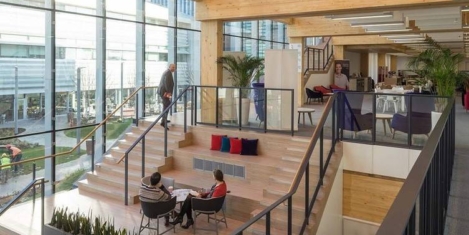November 14, 2018
Quarter of UK workforce have turned down a job for not offering flexible working
 A new study claims that UK workers of all ages have shown a demand for flexible working. According to the research of 2,300 people commissioned by communications technology firm TeleWare, employees are actively turning down jobs that don’t offer flexible working. A quarter of all employees have turned down a job in the past for this reason. Whilst a further third (31 percent) would actively do so. Although the proportion of those that have done so is higher amongst millennials (40 percent), three in 10 (29 percent) employees over 45 would turn down a job if flexible working options were not on offer. More →
A new study claims that UK workers of all ages have shown a demand for flexible working. According to the research of 2,300 people commissioned by communications technology firm TeleWare, employees are actively turning down jobs that don’t offer flexible working. A quarter of all employees have turned down a job in the past for this reason. Whilst a further third (31 percent) would actively do so. Although the proportion of those that have done so is higher amongst millennials (40 percent), three in 10 (29 percent) employees over 45 would turn down a job if flexible working options were not on offer. More →









 Over half of home workers say they appreciate the benefits that home working offers but nearly a quarter complain of loneliness too, a new survey from BHSF claims. When asked how working from home makes them feel, the top three responses were: free (50 percent), in control (47 percent) and calm (46 percent). However, a significant number of those surveyed chose more negative words to describe their feelings. Just over a quarter (26 percent) said that working from home made them feel remote, 24 percent felt isolated and 21 percent lonely.
Over half of home workers say they appreciate the benefits that home working offers but nearly a quarter complain of loneliness too, a new survey from BHSF claims. When asked how working from home makes them feel, the top three responses were: free (50 percent), in control (47 percent) and calm (46 percent). However, a significant number of those surveyed chose more negative words to describe their feelings. Just over a quarter (26 percent) said that working from home made them feel remote, 24 percent felt isolated and 21 percent lonely. 




 Over seven in ten UK employees want their employers to do more to motivate them claims a new study from Reward Gateway which suggests that some of the alarming effects that being unmotivated has on employees included a worsening in mood (60 percent); reduction in productivity levels (48 percent); declining mental health (46 percent) and a reduction in quality of work (40 percent). Over a quarter (26 percent) say their relationships with family and friends suffer and 2 in 10 admit to drinking more alcohol when lacking motivation.
Over seven in ten UK employees want their employers to do more to motivate them claims a new study from Reward Gateway which suggests that some of the alarming effects that being unmotivated has on employees included a worsening in mood (60 percent); reduction in productivity levels (48 percent); declining mental health (46 percent) and a reduction in quality of work (40 percent). Over a quarter (26 percent) say their relationships with family and friends suffer and 2 in 10 admit to drinking more alcohol when lacking motivation.






 Almost half (49 percent) of UK workers are in jobs they are either under- or over-skilled for, according to new research from the CIPD. Its report ‘Over-skilled and underused: Investigating the untapped potential of UK skills’ surveyed 3,700 UK employees and found that more than a third (37 percent) of workers have the skills to cope with more demanding duties than they currently have. At the opposite end of the scale, one in ten (12 percent) employees said they lacked all the skills needed to carry out their job effectively. This means that as many as half (49 percent) of UK workers could be in the wrong job, based on their skill level. The UK has one of most skilled workforces in the world, with 42 percent of workers qualified to degree level, yet it also has the highest proportion of jobs within the OECD which require no qualifications at all.
Almost half (49 percent) of UK workers are in jobs they are either under- or over-skilled for, according to new research from the CIPD. Its report ‘Over-skilled and underused: Investigating the untapped potential of UK skills’ surveyed 3,700 UK employees and found that more than a third (37 percent) of workers have the skills to cope with more demanding duties than they currently have. At the opposite end of the scale, one in ten (12 percent) employees said they lacked all the skills needed to carry out their job effectively. This means that as many as half (49 percent) of UK workers could be in the wrong job, based on their skill level. The UK has one of most skilled workforces in the world, with 42 percent of workers qualified to degree level, yet it also has the highest proportion of jobs within the OECD which require no qualifications at all.











November 7, 2018
Will technology prove a threat or a godsend in the new workplace?
by Matt Weston • Comment, Technology, Workplace
More →